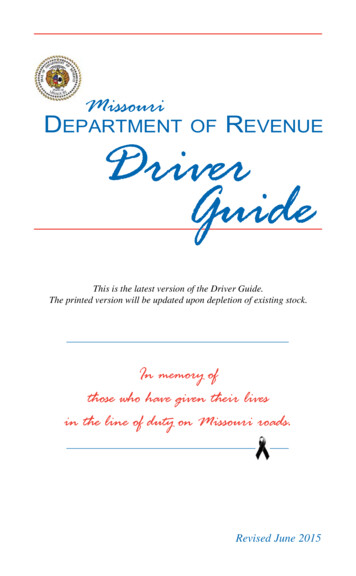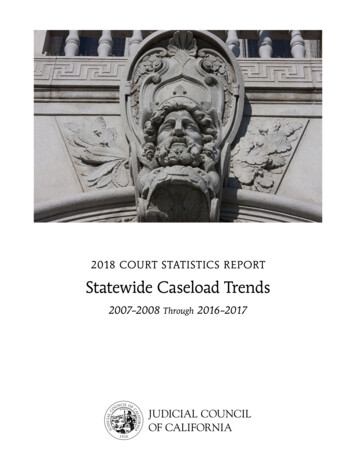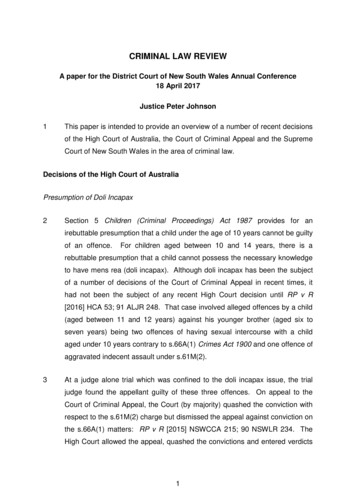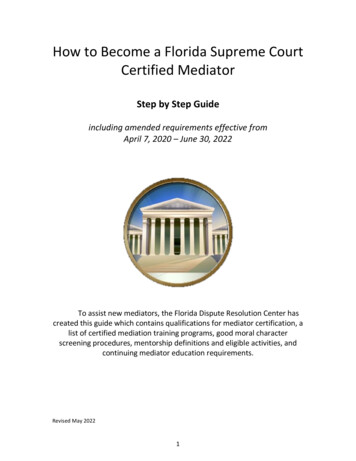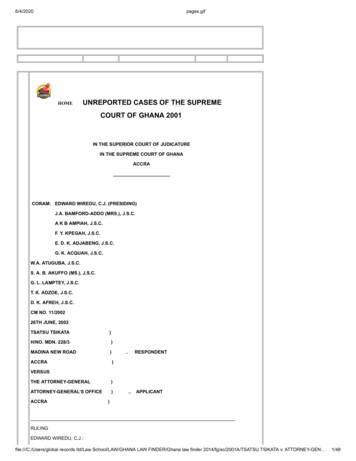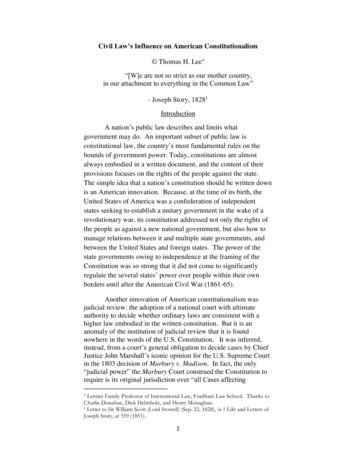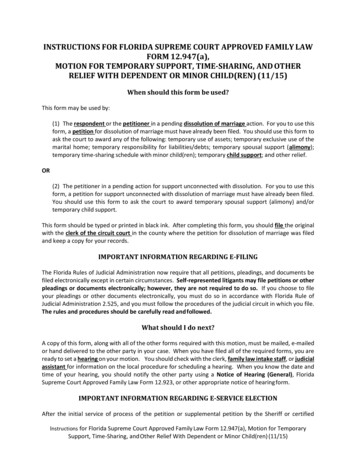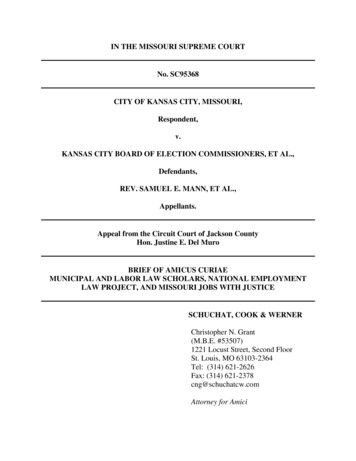
Transcription
IN THE MISSOURI SUPREME COURTNo. SC95368CITY OF KANSAS CITY, MISSOURI,Respondent,v.KANSAS CITY BOARD OF ELECTION COMMISSIONERS, ET AL.,Defendants,REV. SAMUEL E. MANN, ET AL.,Appellants.Appeal from the Circuit Court of Jackson CountyHon. Justine E. Del MuroBRIEF OF AMICUS CURIAEMUNICIPAL AND LABOR LAW SCHOLARS, NATIONAL EMPLOYMENTLAW PROJECT, AND MISSOURI JOBS WITH JUSTICESCHUCHAT, COOK & WERNERChristopher N. Grant(M.B.E. #53507)1221 Locust Street, Second FloorSt. Louis, MO 63103-2364Tel: (314) 621-2626Fax: (314) 621-2378cng@schuchatcw.comAttorney for Amici
TABLE OF CONTENTSTABLE OF AUTHORITIES . iiiJURISDICTIONAL STATEMENT .1STATEMENT OF FACTS .1PURPOSE AND INTEREST OF AMICI CURIAE .1POINTS RELIED ON .4ARGUMENT .6Introduction .6Standard of Review .10I. THE TRIAL COURT ERRED IN GRANTING JUDGMENT FORPLAINTIFF/RESPONDENT BECAUSE IT FAILED TO PROPERLYCONSIDER THE POWER OF CHARTER CITIES TO REGULATEWAGES IN THAT ARTICLE VI, SECTION 19(A) OF THE MISSOURICONSTITUTION IS MEANT TO BE A BROAD GRANT OF AUTHORITYAND CHARTER CITIES DO NOT LOSE POWER UNDER THATPROVISION UNLESS THE GENERAL ASSEMBLY EXPRESSES ACLEAR INTENT TO TAKE IT AWAY. .12II. THE TRIAL COURT ERRED IN GRANTING JUDGMENT FORPLAINTIFF/RESPONDENT BECAUSE THE INITIATIVE PETITION ISAUTHORIZED BY ARTICLE VI, SECTION 19(A) IN THAT IT DOESi
NOT CONFLICT WITH MISSOURI’S MINIMUM WAGE LAW OR ANYOTHER STATE LAW. .18A. The Minimum Wage Law Is a Law of Prohibition and Can Only Be Readas Requiring Employers to Pay Workers No Less Than the State MinimumWage.20B. The Minimum Wage Law Does Not Express a Clear Intent to Deny Citiesthe Power to Establish Minimum Wage Standards to Supplement StateLaw. .231. The Initiative Petition constitutes a permissible supplementation of theMinimum Wage Law.232. The Minimum Wage Law does not occupy the field. .28C. State Law Recognizes that Cities May Enact Local Minimum WageOrdinances.30D. The Majority of Courts that Have Considered Whether Local MinimumWage Laws Conflict with State Law Have Found No Conflict andRecognize the Need of Cities to Address Issues in their Communities .35CONCLUSION .45CERTIFICATE OF COMPLIANCE WITH RULE 84.06.47CERTIFICATE OF SERVICE .48ii
TABLE OF AUTHORITIESCasesBorron v. Farrenkopf, 5 S.W.3d 618 (Mo. App. W.D. 1999) .29Brotherhood of Stationary Engineers v. City of St. Louis, 212 S.W.2d 454 (Mo.App. 1948) .28Brown v. Morris, 290 S.W.2d 160 (Mo. banc 1956) .33Cape Motor Lodge, Inc. v. City of Cape Girardeau, 706 S.W.2d 208 (Mo. banc1986) . passimCity Council of Baltimore v. Sitnick, 255 A.2d 376 (Md. Ct. App. 1969) . 27, 35City of Kansas City v. Carlson, 292 S.W.3d 368 (Mo. App. W.D. 2009) . passimCity of Kansas City v. La Rose, 524 S.W.2d 112 (Mo. banc 1975) . passimCity of Willow Springs v. Missouri State Librarian, 596 S.W.2d 441 (Mo. banc1980) .34Clair v. Whittaker, 557 S.W.2d 236 (Mo. banc 1977).34Cooperative Home Care, Inc. v. City of St. Louis, Case No. 1522-CC10607 (22ndCir. Oct. 14, 2015), appeal filed, SC95401 (Mo. Dec. 4, 2015) .7, 9Craighead v. City of Jefferson, 898 S.W2d 543 (Mo. 1995) .11Dannheiser v. City of Henderson, 4 S.W.3d 542 (Ky. 1999) .37Filo Foods, LLC v. City of SeaTac, 357 P.3 1040 (Wash. banc 2015).38Frech v. City of Columbia, 693 S.W.2d 813 (Mo. 1985) . 15, 28iii
Hammerschmidt v. Boone County, 877 S.W.2d 98 (Mo. banc 1994) .33Kansas City v. Chastain, 420 S.W.3d 550 (Mo. banc 2014) .10Kansas City v. Troutner, 544 S.W.2d 295 (Mo. App. 1976) . 26, 27Kentucky Restaurant Association, Inc. v. Louisville/Jefferson County MetroGovernment, No. 2015-CA-000996 (Ky. Ct. App. June 30, 2015) .37Krug v. Mary Ridge, 271 S.W.2d 867 (Mo. App. 1954) .5, 27Main Street Coalition for Economic Growth v. City of Madison, No. 04-CV-3853,(Dane County Cir. Ct., Branch 2, Apr. 21, 2005) .35Miller v. City of Town & Country, 62 S.W.3d 431 (Mo. App. E.D. 2001) .17Missouri Ass'n of Club Execs., Inc. v. State, 208 S.W.3d 885 (Mo. banc 2006) .33Missourians to Protect the Initiative Process v. Blunt, 799 S.W.2d 824 (Mo. banc1990) .11Murray v. Missouri Highway and Transp. Com’n, 37 S.W.3d 228 (Mo. banc 2001).34New Mexicans for Free Enterprise v. City of Santa Fe, 126 P.3d 1149 (N. Mex. Ct.App. 2005) .35Page W., Inc. v. Cmty. Fire Prot. Dist. of St. Louis Cty., 636 S.W.2d 65 (Mo. banc1982) . 23, 24Patty Sue, Inc. v. City of Springfield, 381 S.W.3d 360 (Mo. App. W.D. 2012) . 22, 23, 24iv
Pollock v. Wetterau Food Distribution Grp., 11 S.W.3d 754 (Mo. App. E.D. 1999).23Rizzo v. State, 189 S.W.3d 576 (Mo. banc 2006) .33RUI One Corp. v. City of Berkeley, 371 F.3d 1137 (9th Cir. 2004) .38State ex rel. Nixon v. American Tobacco Co., 34 S.W.3d 122 (Mo. banc 2000) .10State ex rel. Trotter v. Cirtin, 941 S.W.2d 498 (Mo. 1997) .11Tolentino v. Starwood Hotels & Resorts Worldwide Inc., 437 S.W.3d 754 (Mo.banc 2014) . 20, 25Turner v. Sch. Dist. of Clayton, 318 S.W.3d 660 (Mo. banc 2010) .6Union Electric Co. v. Crestwood, 499 S.W.2d 480 (Mo. 1973).30United Gamefowl Breeders’ Ass’n of Missouri v. Nixon, 19 S.W.3d 137 (Mo.2000) .11Vest v. Kansas City, 194 S.W.2d 38 (Mo. 1946) . 4, 23, 26, 27Wholesale Laundry Board of Trade v. City of New York, 12 N.Y.2d 998 (1963)aff’g, 17 A.D.2d 327 (1962) .36Statutes29 U.S.C. § 218 .31§ 82.082, KRS .38§ 83.410, KRS .37§ 67.1571, RSMo. . passimv
Statutes (cont'd)§ 70.220, RSMo. .15§ 71.010, RSMo .37§ 285.055, RSMo. ("HB722"). passim§ 288.062.6(3), RSMo. . 19, 30, 31§§ 290.500, et seq., RSMo. . 6, 21, 22, 29§ 290.502, RSMo. .20, 21, 22§ 290.523, RSMo. .28, 29§ 290.525, RSMo. . 29§ 290.527, RSMo. . 29Regulations8 CSR 30-4.010 .318 CSR 30-4.020 .228 CSR 30-4.060 .2929 C.F.R. § 525.20 .31Constitutional ProvisionsMo. Const. art. V, § 3.1Mo. Const. art. VI, § 19(a) . passimvi
Other AuthoritiesBureau of Business and Economic Research, University of New Mexico,“Measuring the Employment Impacts of the Living Wage Ordinance in Santa Fe,New Mexico” (Jun. 2006) .44Darin M. Dalmat, Bringing Economic Justice Closer to Home: The Legal Viabilityof Local Minimum Wage Laws Under Home Rule, 39 Colum. J.L. & Soc. Probs.(2005) . 13, 14, 25Arindrajit Dube et al., “Minimum Wage Effects across State Borders: EstimatesUsing Contiguous Counties” The Review of Economics and Statistics (Nov.2010) 92(4): 945–64 .43Daniel Mandelker, et al., State and Local Government in a Federal System (8th ed.2014) .2Merriam-Webster.com, “Minimum,” http://www.merriamwebster.com/dictionary/minimum (last visited March 17, 2016) .22Missouri Att’y Gen., Opinion No. 194-2009 (Oct. 23, 2009) .17Eric Morath, “What Happened to Fast-Food Workers When San Jose Raised theMinimum Wage?” Wall Street Journal (Apr. 9, 2014) .44National Employment Law Project, City Minimum Wage Laws: Recent Trendsand Economic Evidence (Sept. 2015) .39vii
Raise the Minimum Wage, Local Minimum Wage Laws and Current /local-minimum-wage (last viewedDec. 7, 2015) .39Michael Reich et al., University of California, Berkeley, “The Economic Effects ofa Citywide Minimum Wage” (2007) .43Peter Salish & Dennis Tuchler, Missouri Local Government: A Criticism of aCritique, 14 St. Louis U.L.J. 207 (1969) .2Thomas N. Sterchi, State-Local Conflicts under the New Missouri Home RuleAmendment, 37 Mo. L. Rev. 677 (1972) . 13, 14Jeanine Stewart, “Apocalypse Not: 15 and the cuts that never came,” Puget SoundBusiness Journal, (Oct. 23, 2015) .45Kenneth Vanlandingham, Constitutional Home Rule Since the AMA (NLC) Model,17 Wm. & Mary L. Rev. 1 (1975) .13viii
JURISDICTIONAL STATEMENTThe issue before this Court is whether the Circuit Court properly grantedPlaintiff’s Petition for Removal of a Ballot Question. Among other things, thisaction involves the validity and constitutionality of two state statutes, Section67.1571, RSMo., and Section 285.055, RSMo. The trial court relied on both infinding that the Initiative Petition in question conflicts with state law,notwithstanding arguments by Intervenors that these laws were unconstitutionallyenacted in violation of Missouri’s single subject, clear title, and original purposeprovisions. Accordingly, this Court has jurisdiction under Article V, Section 3, ofthe Missouri Constitution because this case involves “the validity. of a statute. ofthis state.”STATEMENT OF FACTSAmici adopt the Statement of Facts in the Brief of Intervenors/Appellantsfiled in this Court.PURPOSE AND INTEREST OF AMICI CURIAEAmici Municipal and Labor Law Scholars are professors at various lawschools in Missouri.1 They have long been engaged in the study and teaching of1Amici Municipal and Labor Law Scholars are Matt Bodie (St. Louis UniversitySchool of Law) (“SLU”), Miriam A. Cherry (SLU), Marion Crain (WashingtonUniversity Law), Susan A. FitzGibbon (SLU), Daniel R. Mandelker (Washington1
municipal or labor law. All of them have studied issues surrounding the legalviability of local employment and minimum wage laws, and some have publishedon the power of charter cities.2 Their interest here derives from theirresponsibilities as law professors. They teach their students to carefully readconstitutional provisions and statutes with attention to their text, history, andpurpose. They also caution students that it is not the duty of judges to decidepolicy, but the job of the people. They believe that following these standards leadsto only one conclusion in this case—that local governments in Missouri have thepower to enact local minimum wage requirements and that such requirements donot conflict with state law.The National Employment Law Project (“NELP”) is a national research andpolicy organization known for its expertise on workforce issues. NELP hasUniversity Law), Marcia L. McCormick (SLU), Peter W. Salsich Jr. (SLU), PeggieR. Smith (Washington University Law), and Karen L. Tokarz (WashingtonUniversity Law). Institutional affiliations are listed for identification purposesonly.2See, e.g., Peter Salish & Dennis Tuchler, Missouri Local Government: ACriticism of a Critique, 14 St. Louis U.L.J. 207 (1969); Daniel Mandelker, et al.,State and Local Government in a Federal System (8th ed. 2014).2
assisted efforts by advocacy groups, local elected officials, and workers in citiesacross the country, including the City of Kansas City, to enact local minimumwage legislation; and, it has extensive background in issues surrounding the powerand authority of cities to enact local minimum wage requirements. Their interesthere is in advancing and protecting the ability of cities and citizens to pass localminimum wage laws to address issues of local concern and lift wages for lowincome workers for whom the value of wages has declined for years.Missouri Jobs with Justice (“JwJ”) is a coalition of community, labor,student, and religious groups. It is committed to fighting for economic justice andimproving the lives of working people. It has supported efforts by citizens andcouncil people in Kansas City and other municipalities to enact local minimumwage requirements; and, it counts as members low wage workers in the City ofKansas City who would receive a raise under the Initiative Petition at issue. Byjoining this Brief, JwJ seeks to advance the interests of citizens and low wageworkers.33Both Plaintiff/Respondent and Intervenors/Appellants have consented to Amicifiling this brief.3
POINTS RELIED ONI.THE TRIAL COURT ERRED IN GRANTING JUDGMENT FORPLAINTIFF/RESPONDENT BECAUSE IT FAILED TO PROPERLYCONSIDER THE POWER OF CHARTER CITIES TO REGULATEWAGES IN THAT ARTICLE VI, SECTION 19(A) OF THEMISSOURI CONSTITUTION IS MEANT TO BE A BROAD GRANTOF AUTHORITY AND CHARTER CITIES DO NOT LOSE POWERUNDER THAT PROVISION UNLESS THE GENERAL ASSEMBLYEXPRESSES A CLEAR INTENT TO TAKE IT AWAY.Mo. Const. art. VI, § 19(a)Cape Motor Lodge, Inc. v. City of Cape Girardeau, 706 S.W.2d 208 (Mo.banc 1986)City of Kansas City v. Carlson, 292 S.W.3d 368 (Mo. App. W.D. 2009)II.THE TRIAL COURT ERRED IN GRANTING JUDGMENT FORPLAINTIFF/RESPONDENT BECAUSE THE INITIATIVEPETITION IS AUTHORIZED BY ARTICLE VI, SECTION 19(A) INTHAT IT DOES NOT CONFLICT WITH MISSOURI’S MINIMUMWAGE LAW OR ANY OTHER STATE LAW.Vest v. Kansas City, 194 S.W.2d 38 (Mo. 1946)City of Kansas City v. La Rose, 524 S.W.2d 112 (Mo. banc 1975)4
City of Kansas City v. Carlson, 292 S.W.3d 368 (Mo. App. W.D. 2009)Krug v. Mary Ridge, 271 S.W.2d 867 (Mo. App. 1954)5
ARGUMENTIntroductionThis case involves significant questions surrounding the right of citizens toadvance their interests and to address matters of local concern by initiative petition.Intervenors and Amici maintain that the Initiative Petition does not conflict withstate law including Missouri’s Minimum Wage Law, §§ 290.500, et seq., RSMo.(“Minimum Wage Law”). Charter cities, including the City of Kansas City, havethe power to establish local minimum wage and enforcement standards underArticle VI, Section 19(a) of the Missouri Constitution, and the Minimum WageLaw does not deny them that power.The trial court found in its September 22, 2015 Order that the InitiativePetition conflicts with Section 67.1571, RSMo., and Section 285.055, RSMo.(hereinafter “HB 722”). (Judgment/Order at 1–2; L.F. at 62–63.) The City alsoargued, in its response to Intervenors’ Motion for a New Trial/To ReconsiderJudgment, that the Initiative Petition is preempted by the Minimum Wage Law.(Pl.’s Suggs in Oppo. at 6; L.F. at 82.) While the trial court did not mention thisclaim in its Order denying Intervenors’ Motion, (L.F. at 102), Amici think itimportant that they address the issue since the City may raise it again. See Turnerv. Sch. Dist. of Clayton, 318 S.W.3d 660, 664 (Mo. banc 2010) (stating that theCourt may affirm the trial court’s judgment under “any appropriate theory”6
supported by the record). A growing number of cities across the country, includingcities in Missouri, are using minimum wage ordinances to address problems ofpoverty, health, and income inequality in their communities. The claim that a stateminimum wage law bars cities from taking such action, despite the request ofcitizens to raise the minimum wage locally, deserves serious scrutiny.4In any case involving a purported conflict between a proposed ordinance anda state law, the Court must begin with the Missouri Constitution. An importantchange occurred in 1971 when the people adopted Article VI, Section 19(a). Priorto the enactment of the provision, cities needed statutory authorization to exercisebasic powers. But now, a charter city like Kansas City has “all powers which thegeneral assembly of the state of Missouri has authority to confer upon any city,provided such powers . . . are not limited or denied . . . by statute.” Mo. Const. art.VI, § 19(a). Reflective of this change, the burden of showing that an ordinance4Another case pending before this Court— Cooperative Home Care, Inc. v. City ofSt. Louis, Case No. 1522-CC10607 (22nd Cir. Oct. 14, 2015), appeal filed,SC95401 (Mo. Dec. 4, 2015) —raises many of the same issues as this case.Notably, the City of St. Louis has argued that its minimum wage ordinance is validand does not conflict with the Minimum Wage Law. Unfortunately, and somewhatsurprisingly, the City of Kansas City has taken the opposite position.7
conflicts with state law is high. The powers of charter cities may only be limitedby a state law enacted with a clear intent to do so:Since constitutional charter cities would no longer need statutoryauthorization to exercise a wide range of powers, such cities couldelect to establish their own procedures and limitation unless the statutein question was so comprehensive and detailed as to indicate a clearintent that it should operate as both authorization and limitation.Cape Motor Lodge, Inc. v. City of Cape Girardeau, 706 S.W.2d 208, 212 (Mo.banc 1986) (citation omitted) (emphasis added).Here, the trial court erred in finding that Section 67.1571, RSMo., andHB722 prohibit the City, by initiative petition, from establishing a local minimumwage. While both statutes express an intent on the part of the General Assembly tolimit a city’s power to enact a minimum wage ordinance, Amici agree withIntervenors that Section 67.1571 was unconstitutionally enacted in violation ofMissouri’s single subject, clear title, and original purpose requirements, andencourage this Court to closely examine the constitutionality of HB 722 for thereasons articulated by Intervenors in their Brief to this Court).55Amici recognize that Intervenors must claim that HB722 was unconstitutionallyenacted and does not bar their Initiative Petition because HB 722 went into effectbefore their Petition could be voted on. The situation is different with respect to8
In addition, despite the City’s arguments to the contrary, (L.F. at 82–83), theMinimum Wage Law does not limit a city’s power to enact a local minimum wageordinance. Any fair reading of the Minimum Wage Law shows that it sets a floor.It prohibits employers from paying employees below a certain minimum wage rate.Under Article VI, Section 19(a) and long-established Missouri case law, cities maysupplement laws of prohibition. In other words, they may go further than state lawallows and set a higher standard by ordinance that prohibits more of the same typeof conduct. This is confirmed by a reference to local minimum wage ordinances inMissouri’s Employment Security Law, incorporation of federal regulationsSt. Louis’ minimum wage ordinance because the General Assembly did not passHB 722 over the Governor’s veto until after the City of St. Louis enacted itsordinance on August 28, 2015. See Cooperative Home Care, Inc., supra.Regardless, Amici’s central argument remains the same—the Minimum Wage Lawdoes not prohibit cities from establishing minimum wage standards. In addition,Amici’s argument is not dependent on language in HB 722 recognizing localminimum wage ordinance requirements in effect on August 28, 2015. While thatlanguage is further evidence that the Minimum Wage Law does not prohibit localminimum wage ordinances (as explained below), Amici submit that cities had thepower to enact minimum wage requirements before the General Assembly soughtto enact HB 722 and have always had that power under section 19(a).9
interpreting the Fair Labor Standards Act (“FLSA”) into the Minimum Wage Law,and multiple efforts by the General Assembly to expressly deny cities the power toenact minimum wage requirements. It is also the view of a majority of courts inother states that have considered this issue. Accordingly, under the principles setforth in Cape Motor Lodge, the General Assembly has not expressed clear intentby the Minimum Wage Law to bar cities from establishing minimum wagestandards, and this Court should find that the Initiative Petition does not conflictwith state law.Standard of ReviewThe trial court decided this matter on the pleadings. On appeal, this Courtdetermines whether the facts pleaded in Plaintiff’s Petition are insufficient as amatter of law. State ex rel. Nixon v. American Tobacco Co., 34 S.W.3d 122, 134(Mo. banc 2000). In this posture, Plaintiff “admits, for purposes of the motion, thetruth of all well pleaded facts in the opposing party's pleadings.” Id. (internalquotations and citations omitted).The dispositive issue is whether the proposed ordinance conflicts with statelaw and therefore violates the Missouri Constitution. This is a legal questionsubject to de novo review. Kansas City v. Chastain, 420 S.W.3d 550, 554 (Mo.banc 2014).10
Missouri law authorizes courts to conduct pre-election review of the facialconstitutionality of an initiative petition. See Missourians to Protect the InitiativeProcess v. Blunt, 799 S.W.2d 824, 828 (Mo. banc 1990). That being said, thisCourt should “consider only those threshold issues that affect the integrity of theelection itself, and that are so clear as to constitute a matter of form.” UnitedGamefowl Breeders’ Ass’n of Missouri v. Nixon, 19 S.W.3d 137, 139 (Mo. banc2000). It should “not address matters of substantive interpretation prior to theelection.” State ex rel. Trotter v. Cirtin, 941 S.W.2d 498, 500 (Mo. banc 1997)(refusing to hear pre-election claim that initiative petition on zoning conflicts withmore specific provisions in city charter regarding zoning and is preempted byprovisions of Chapter 89 of state law on zoning); Craighead v. City of Jefferson,898 S.W2d 543, 547 (Mo. banc 1995) (where issues of law raised by city were“not so clear or settled as to constitute matters of form,” including the issue ofwhether a vote on initiative petition was preempted by state law, the Court wouldnot “rush to review the possible legal effect of such matters so prematurely”).11
I.THE TRIAL COURT ERRED IN GRANTING JUDGMENT FORPLAINTIFF/RESPONDENT BECAUSE IT FAILED TO PROPERLYCONSIDER THE POWER OF CHARTER CITIES TO REGULATEWAGES IN THAT ARTICLE VI, SECTION 19(A) OF THEMISSOURI CONSTITUTION IS MEANT TO BE A BROAD GRANTOF AUTHORITY AND CHARTER CITIES DO NOT LOSE POWERUNDER THAT PROVISION UNLESS THE GENERAL ASSEMBLYEXPRESSES A CLEAR INTENT TO TAKE IT AWAY.Under Article VI, Section 19(a) of the Missouri Constitution, the City ofKansas City has “all powers which the general assembly of the state of Missourihas authority to confer upon any city, provided such powers are consistent with theconstitution . . . and are not limited or denied either by the charter . . . or bystatute.” Mo. Const. art. VI, § 19(a). When a party challenges a constitutionalcharter city’s power to pass an ordinance under Section 19(a), the dispositivequestion for the Court “[is] not whether the City had authority for its ordinance, butwhether its authority to enact the [ordinance] was denied by other law.” City ofKansas City v. Carlson, 292 S.W.3d 368, 371 (Mo. App. W.D. 2009) (emphasisadded). “[T]he emphasis no longer is whether a home rule city has the authority toexercise the power involved; the emphasis is whether the exercise of that powerconflicts with the Missouri Constitution, state statutes or the charter itself.” Cape12
Motor Lodge, 706 S.W.2d at 211.The change in 1971, when the people of this state adopted Article VI,Section 19(a), was significant. In enshrining this provision in the MissouriConstitution, the state adopted the “legislative” model of local governance, givingregulatory powers to cities as broad as those belonging to the General Assembly.Darin M. Dalmat, Bringing Economic Justice Closer to Home: The Legal Viabilityof Local Minimum Wage Laws Under Home Rule, 39 Colum. J.L. & Soc. Probs.93, 104–06, 139 (2005) (noting that Missouri follows the legislative model ofhome rule powers proposed by the American Municipal Association (“AMA”) anddrafted by Jefferson Fordham); see also Thomas N. Sterchi, State-Local Conflictsunder the New Missouri Home Rule Amendment, 37 Mo. L. Rev. 677, 681 (1972)(explaining that Article VI, Section 19(a) is based on the AMA’s modelconstitutional provision for home rule) (available s4/6); Kenneth Vanlandingham,Constitutional Home Rule Since the AMA (NLC) Model, 17 Wm. & Mary L. Rev.1, 4 (1975) (noting Missouri’s adoption of the AMA model provision) (available .In the past, in the event of a conflict between a statute and an ordinance, thestatute prevailed if the court labeled the question “of statewide concern” or “ofgeneral concern,” while the ordinance prevailed if the activity was “purely13
municipal.” Sterchi, supra, at 679, 681. This test caused great difficulty due to itsvagueness and to what, in fact, constitutes a matter of state concern. Id. at 679–80.Moreover, results under the test were prone to change over time, since what mayonce be a municipal issue “may be as readily
CITY OF KANSAS CITY, MISSOURI, Respondent, v. KANSAS CITY BOARD OF ELECTION COMMISSIONERS, ET AL., Defendants, REV. SAMUEL E. MANN, ET AL., Appellants. Appeal from the Circuit Court of Jackson County Hon. Justine E. Del Muro BRIEF OF AMICUS CURIAE MUNICIPAL AND LABOR LAW SCHOLARS, NATIONAL EMPLOYMENT LAW PROJECT, AND MISSOURI JOBS WITH JUSTICE


